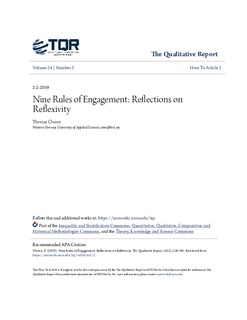Nine Rules of Engagement: Reflections on Reflexivity
Journal article, Peer reviewed
Published version

Åpne
Permanent lenke
http://hdl.handle.net/11250/2589430Utgivelsesdato
2019Metadata
Vis full innførselSamlinger
Originalversjon
Owren, T. (2019). Nine rules of engagement: Reflections on reflexivity. The Qualitative Report, 24(2), 228-241.Sammendrag
Wishing to be reflexive, to critically examine our assumptions, is easy. Doing it is less so. For researchers doing a study in their own professional field, it represents a particular challenge. In this essay, I explore this challenge using my own study as exemplar. I am researching workplace inclusion of workers with intellectual disability. As a professional, I have worked with and for people with intellectual disability for many years. The knowledge I bring to my inquiry – about the inabilities, vulnerabilities and needs ascribed to persons labelled thus – is deeply entrenched in common culture, as well as in my professional training. How can I handle this knowledge in my research? To what extent may, or must, it command my perceptions and interpretations? How may I challenge and look beyond it? Exploring this, I consult a handful of researchers who have examined pitfalls of involving informants with intellectual disability in research. I also call upon four giants of social science – Hans-Georg Gadamer, Charles Taylor, Pierre Bourdieu and Michel Foucault – as well as Brian Eno, British musician and producer extraordinaire. Departing from a concrete situation, the essay winds its way through nine discussions, each generating a “rule of engagement.” Although the discussions are specific to my project, these nine methodological suggestions, ranging from seemingly trivial to decidedly non-trivial, are not. My belief is that they may hold some interest for any qualitative researcher.
